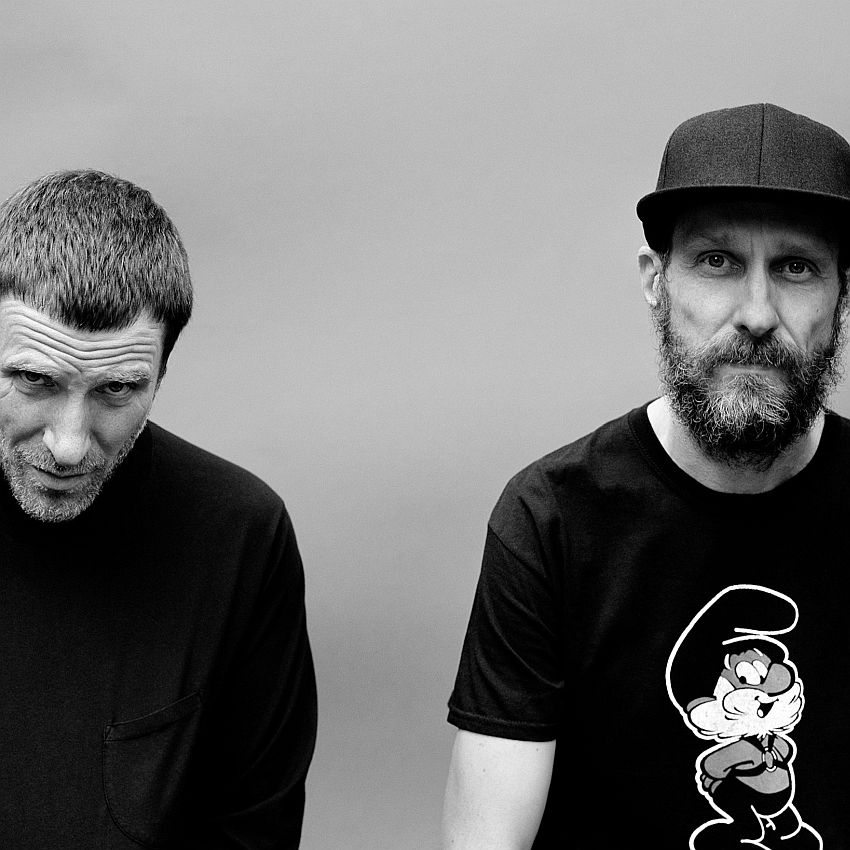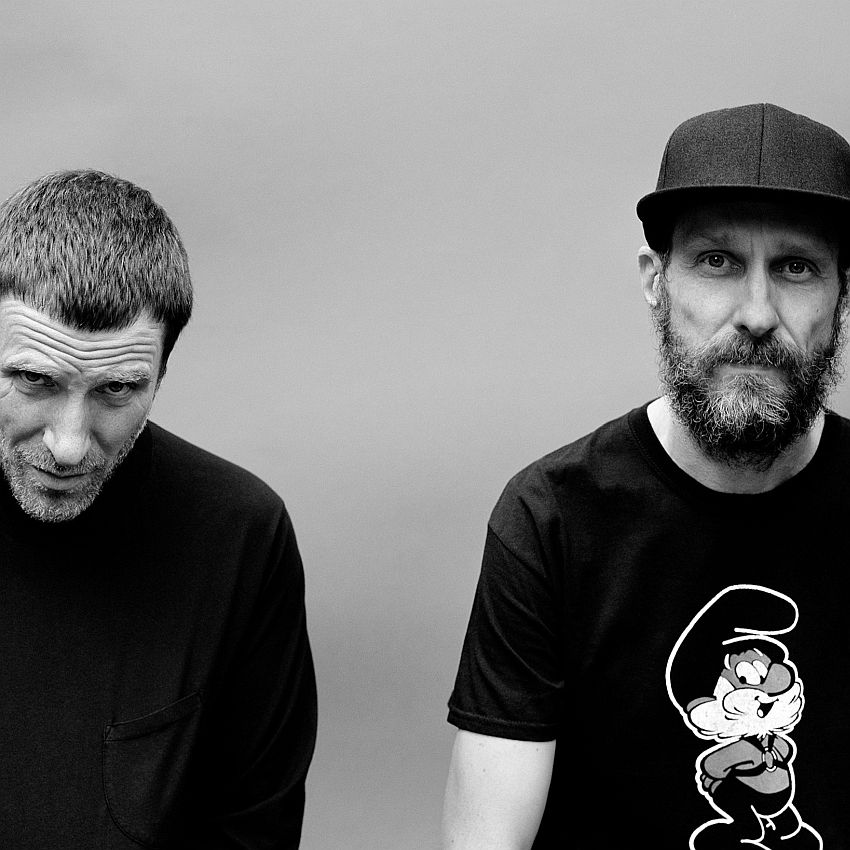
Photo courtesy of the group’s Facebook
On the morning that a 90-year-old grandmother became the first person in the UK to receive the coronavirus vaccine, Jason Williamson, vocalist and lyricist for electro-punk duo Sleaford Mods, could be found sitting calmly in his kitchen, dressed in a striped robe and cup of tea in front of him, and feeling reflective about what that moment meant for his home country.
“I don’t quite understand why we got it first,” he says, peering briefly out the window. “But I’m not in the frame of mind of questioning it. I’m just happy that there is an alternative now. I’m hoping that it will be the start of civilization trying to recover from this.”
For Williamson and his musical partner Andrew Fearn, the desire to return to normalcy would be welcome right now as they’ve got an album—Spare Ribs—to promote. Since lockdown, the duo have only performed live together twice, both times for streaming events. Without a musical outlet for his furious, hilarious, poetic screeds against government malfeasance, class inequality, and the world’s persistent lack of empathy, Williamson has been reduced to feeding his anger to the band’s nearly 77,000 Twitter followers.
And watching Sleaford Mods perform, it seems that he needs that creative release valve. As he shouts and sings over Fearn’s scrappy, thumping productions, Williamson tenses up his body, whipping his right hand over his head as if he’s trying to ward off a pesky gnat and generally looking like he’s about to pound the nearest Tory to dust.
Sleaford Mods is the outlet that Williamson has long needed. Though he always wanted to be in music, he spent much of his 20s and 30s in his chosen home of Nottingham, England, trying his hand at guitar rock and pop while holding down a variety of menial jobs. Along the way, he developed a nasty coke habit. But as he found his voice through his fractured lyrics and found the perfect creative partner in Fearn, Williamson has been more driven than ever. Since ‘07, they’ve released 11 full-lengths and almost as many EPs and singles.
That should tell you everything about how bugfuck crazy the situation in the UK has been over these past 15 years. Much of Spare Ribs was written as the country rushed toward Brexit in the midst of a pandemic, and both catastrophes mark this album like piss stains. Williamson takes Prime Minister Boris Johnson’s chief advisor Dominic Cummings to task for his blinkered guidance on “Shortcummings,” gobs at the “class tourists” using these crises to further their musical careers on “Nudge It.” And on the title track, over a particularly scaly beat from Fearn, wonders at the UK government’s indifference toward the homeless community.
As is often the case with performers that get wild-eyed and frenzied on stage, Williamson was soft spoken and resolved during our recent Zoom chat, looking back over the arc of his career with humility and punctuating some of his remarks with quick barks of laughter. But through it all, the itch to grab a mic and fume while Fearn bobbles along beside him hummed almost visibly under his skin. With any luck, he can satisfy that yearning soon. — Robert Ham
How has it been for you as an artist to not be able to get out and perform and be in this holding pattern, especially in the run up to your new album’s release?
Jason Williamson: Quite weird. You don’t quite really know until it hits you one day. You’re very short-tempered. You’re quite negative. You’re quite insular. All of those things, really. We’ve not played any gigs apart from March, just before it. It’s been a bit disappointing to say the least.
The sound of Spare Ribs feels a lot closer to the spirit of your early work, a bit of a step away from the more melodic material that was on Eton Alive.
Jason Williamson: A lot of people have said that. I find it quite weird that people think that. But it’s really odd because I’m so close to it. You just can’t differentiate and you can’t see things sometimes. But yeah, carry on…
I was going to say that it doesn’t feel necessarily like a purposeful decision. Or was it? Because I had read that you and Andrew had recorded a bunch of material and then threw all of it out and started over.
Jason Williamson: We did about five tracks in January, and I was, at the time, convinced that three or four of them were massive contenders. We did “Mork N Mindy,” “Shortcummings.” We did “Nudge It” and “Elocution.” “Thick Ear,” but I wasn’t convinced about it being an album track at all. It was a grower, that one. We just got on with it, you know what I mean? When it came to July when we were allowed to go back into the studio again. I don’t know if that confinement and claustrophobia contributed to it. It may well have done.
You guys tend to work pretty quickly, right?
Jason Williamson: Yeah, but we needed to make this album feel as if it moved on. The rest of them, in our minds, each one was an improvement on the last one in some way. This one had to be that as well. We were particularly conscious about using different production techniques, and that’s where the collaborations came in.
The extra vocalists on the album, you mean?
Jason Williamson: Yeah, having Billy Nomates on “Mork N Mindy” and Amy Taylor on “Nudge It.” And we used a sociologist called Lisa McKenzie who did a few sentences at the start of “Top Room.” We were really conscious. We talked with Rough Trade last year—we thought it might be good to have a meeting with them and see what they were looking for. And the idea of collaborations came up. The idea of a producer or a mixer. But we’re not a producer-led band. I don’t think it would work if we got a producer because I think we know what we want. I’m not entirely sure a producer would work. So we kind of pushed this to the limit of, at the time, what we were capable of.
As with previous albums, there is a particularly of its time feel to Spare Ribs. A lot of the lyrics are referring to very recent history. Does it feel impossible to get away from the weight of what’s going on in England?
Jason Williamson: It does, a little bit. I think it’s just so fantastically unbelievable what’s happening that anyone that’s connected to it can see through the bullshit. It’s so dominant that it can’t help but turn up in songs.
You mentioned the song “Elocution” a moment ago. That one really stuck out for me on this record because, if I’m reading it correctly, it seems to be a criticism of folks that are just paying lip service to support people who are struggling right now.
Jason Williamson: The song is a criticism of people from campaigns centered around some kind of social justice in the music game. I just find it a little bit sinister. A lot of these people just don’t come across as very nice people. I’m finding it hard to believe they’ve got a conscience. It’s a bit of a stab at the idea that people use these campaigns to elevate themselves. You get a lot of artists who aren’t great that find themselves doing stuff like presenting awards or fronting campaigns to save whatever. And that, in turn, helps them move up the ladder. They get radio play. All of a sudden they’re on the right playlists. So it’s a kind of commentary on the network machine. The network approach to establishing yourself as a musician.
That leads to another song I wanted to ask about, “Nudge It,” which sounds like you’re taking artists to task for their class tourism.
Jason Williamson: It’s just talking about the idea that some people aren’t what they appear to be. I think it chips away slowly at the reality of good music. It chips away at the idea that you need to strive for something really good. That’s fast disappearing. What you’ve got in its place are a bunch of people that have been reared on middle of the road music and middle of the road values that seem to wear a uniform that would suggest that they’re not. It’s a critique on that, really. And the fact that the middle ground in this country is quite dominant. The lower classes have to work twice as hard or are only seen in music like grime and drill or talent competitions. Which perhaps is the way that actual music has gone. You tend to find a lot of idealist people in the main arena, and that just makes you think, “Why is it predominantly made up of tasteless gatekeepers and people with no perception and no vision?” There’s something wrong there.
Have you had a lot of people knocking on your door asking you to lend your voice to these kinds of idealistic campaigns or to speak out against the issues going on in England?
Jason Williamson: No, not really. I think someone approached me about something to do with environmental issues. But fronting something like that and then going on a 10-day tour on an airplane… it kind of feels a bit stupid, you know?
Again, you and Andrew work at a pretty fast pace, but when it comes to lyrics, are you a first thought/best thought kind of lyricist or do you worry over your words?
Jason Williamson: I don’t worry so much. I just make sure that by the time it comes to recording them, there’s something there that’s good. I keep re-editing them or refining them. If I feel that I’m not explaining myself or it’s too garbled or too surreal, I might try and pull it back in so there’s an anchor there for the listener to relate to. Which I can do fairly quickly these days. We’ve been at it for a while so the lyrics aren’t so much of a problem. It’s just the whole thing. Is the song good? I think what’s more getting on top of us these days is: Are people sick of us? In your country, perhaps not because we’ve not been in people’s faces and we’re mostly unheard of. But in England, we’re all over the place.
At the same time, you do tend to do a lot of interviews and are very upfront with your opinions. Does that become an anchor somewhat, to have your words weighed so heavily? Or are you just happy to have the platform to let these thoughts out?
Jason Williamson: I mean, I am happy to have the platform. But there’s no point in having the platform if you’ve got nothing to say. The other worry is: Do you just repeat yourself? Going back to the idea of lyrics, that’s why I constantly make sure I’m refining everything. You know when you’ve got an idea that you’re happy with, you take that song to court. And if it wins, you put it in a song. You try and dissect what you’re doing so much. Is it worthy? Am I being honest with myself? Does it mean anything? Does anyone care? Do I care? All these things go into it. With the kind of music we do, which is basically punk, the whole idea behind it is just do what you want and say what you want. But that’s easier said than done because you’ve got to find out what you want to say for a start.

